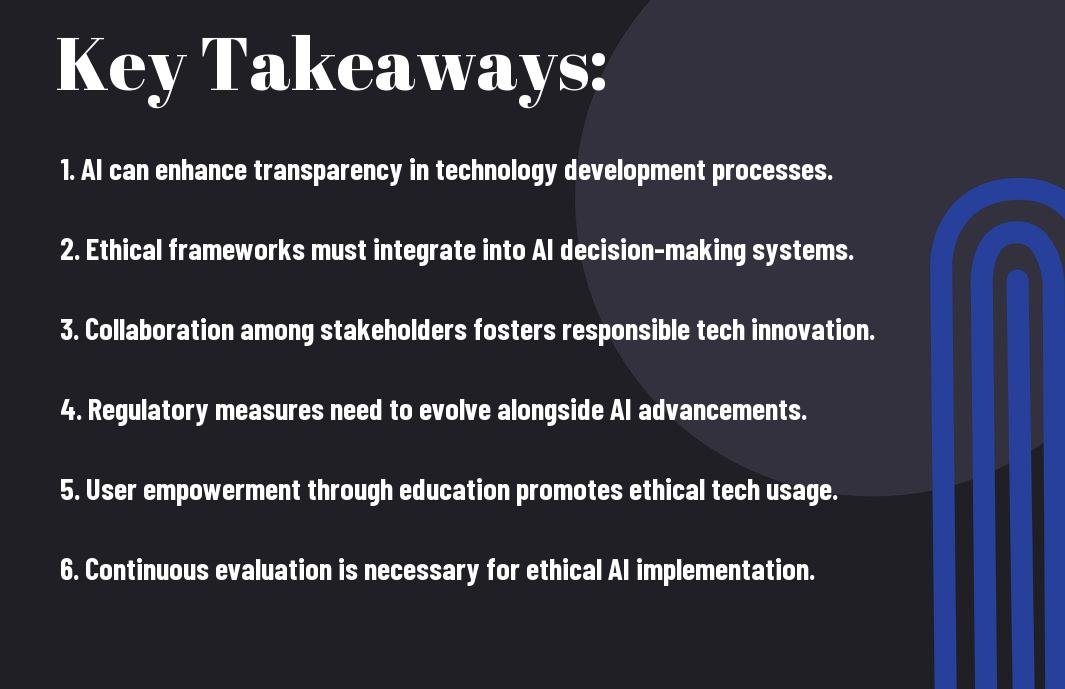AI has the potential to reshape the landscape of technology ethics significantly by 2025. As you navigate the complexities of the digital age, it’s vital to understand how these advancements can promote responsible practices and foster trust among users. In this blog post, you will explore the ways AI can contribute to creating a sustainable framework for ethical tech, highlighting the challenges and opportunities that lie ahead. By grasping these concepts, you can position yourself as a knowledgeable advocate for positive change in the tech industry.

The Current Landscape of Ethical Technology
While the conversation around ethical technology continues to evolve, it is increasingly important for you, as a consumer and stakeholder, to engage with its complexities. Companies are beginning to adopt ethical frameworks, yet issues like data privacy, algorithmic bias, and digital accessibility persist. As the technology landscape matures, understanding these nuances will empower you to advocate for practices that benefit both individuals and society.
Definitions and Key Concepts
For you to navigate the ethical tech landscape effectively, it’s imperative to familiarize yourself with key concepts such as transparency, fairness, and accountability. These principles guide the development and implementation of technologies that prioritize human rights and social justice. By grasping these definitions, you can better assess the impact of technological advancements on your life and community.
Challenges in Implementing Ethical Practices
Definitions of ethical practices can vary widely, complicating their widespread adoption. Factors such as organizational culture, regulatory frameworks, and the rapid pace of technological innovation often hinder effective implementation. Determining a shared understanding of what constitutes ethical behavior in tech remains a challenge for you, as both a consumer and an advocate.
In fact, the challenge of implementing ethical practices is compounded by conflicting interests among stakeholders. Companies may prioritize profit over ethics, while differing cultural perspectives can lead to disagreements on what is acceptable behavior. As you consider these challenges, it becomes evident that a collective effort is necessary to establish a coherent ethical framework in technology development and deployment.

The Role of AI in Shaping Ethical Standards
Even as technology evolves, the role of AI in shaping ethical standards becomes increasingly significant. You may find that AI systems can offer insights into ethical practices, helping organizations align their innovations with societal values. By leveraging machine learning and data analytics, AI can analyze large datasets to identify patterns of ethical behavior, offering guidance for responsible tech development and deployment in 2025.
AI’s Potential in Decision-Making
Ethical frameworks supported by AI can enhance decision-making processes across various sectors. When faced with complex moral dilemmas, AI can assist you in weighing options based on ethical principles, thus fostering an environment where informed and value-driven choices prevail.
AI Tools for Ethical Assessment
Shaping ethical considerations becomes easier with the help of specialized AI tools designed for ethical assessment. These tools can offer bias detection, transparency analysis, and accountability tracking, enhancing your ability to evaluate the impact of technology on individuals and society.
Standards for ethical assessment in technology are continually evolving, and AI tools can play a significant role in establishing these benchmarks. By utilizing algorithms that assess diverse ethical dimensions, you can gain a clearer understanding of the potential consequences your innovations may have. These tools enable you to identify biases, ensure fairness, and maintain transparency in your projects, ultimately leading to more socially responsible outcomes. In 2025, adopting AI tools for ethical assessments may empower you to create technology that respects human rights and upholds the dignity of all stakeholders involved.
Case Studies: AI Implementation in Tech Ethics
Now, you can explore several key case studies demonstrating AI’s role in ethical tech advancements:
- 1. IBM’s Watson: Improved healthcare outcomes with a 38% reduction in treatment errors.
- 2. Microsoft’s AI for Accessibility: 2.6 million people benefited from enhanced accessibility solutions.
- 3. Google’s AI Principles: Company pledged to follow 7 ethical guidelines, influencing over 20 projects.
- 4. OpenAI’s GPT-3: Notably reduced biased responses by 60% following evaluation adjustments.
For further insights, see the Survey XII: What Is the Future of Ethical AI Design?.
Success Stories
To illustrate AI’s positive impact, consider projects like Salesforce’s Einstein, which has successfully reduced customer service response times by 50% through ethical automation strategies. These innovations showcase that when implemented thoughtfully, AI can greatly enhance user experiences while adhering to ethical standards.
Lessons Learned from Failures
Around the AI landscape, several failures highlight the need for more robust ethical frameworks. Notably, Amazon’s recruitment tool faced backlash for gender bias, which resulted in a 25% reduction in diverse hirings.
Another pertinent example is Facebook’s algorithm, which inadvertently promoted harmful content, leading to public outcry and a 15% drop in user trust. These cases underline the importance of rigorous ethical vetting processes that prioritize inclusivity and accountability, ensuring that you are better prepared to avoid similar pitfalls in your own AI applications.

Future Trends: Ethical Tech by 2025
Keep an eye on how the landscape of ethical technology will transform by 2025. As companies strive for accountability and transparency, innovations fueled by Deloitte 2025 Predictions Report ‘Generative AI’ will emerge, prioritizing ethical design over traditional profit-driven motives.
Predictions for AI Development
At the forefront of the 2025 technology landscape, AI development is set to prioritize ethical standards, focusing on a principle-driven approach. This shift will lead to more responsible AI systems that respect user privacy, diverse perspectives, and societal impact.
The Evolving Role of Stakeholders
About your role as a stakeholder, your increasing involvement will shape ethical tech dynamics. As consumers, regulators, and businesses engage collaboratively, the focus will be on fostering trust and accountability, promoting a healthier tech ecosystem.
For instance, as you align your interests with ethical considerations, the power of collective advocacy will be evident. Stakeholders, including users like you, will influence policies and practices that prioritize ethical tech. This synergy will encourage organizations to adopt principles that resonate with public interests, ensuring technology aligns with societal values.
Policy and Regulation in Ethical AI
Despite the growing importance of ethical considerations in technology, policy and regulation surrounding AI remain fragmented and inconsistent. You should be aware that well-defined regulations can help steer AI development towards more responsible practices. As we approach 2025, it will be vital for stakeholders, including governments, organizations, and individuals, to advocate for comprehensive frameworks that prioritize ethics without stifling innovation.
Government Initiatives
Across the globe, governments are beginning to recognize the necessity of ethical AI policies. You will find that various countries have started implementing initiatives aimed at establishing guidelines for responsible AI usage. These measures often include the involvement of stakeholders from different sectors to ensure a balanced approach to regulation and innovation.
Industry Self-Regulation
Before regulatory frameworks are fully established, many technology companies are taking the initiative to implement self-regulation. You may notice that these organizations are setting internal standards and best practices to foster ethical AI development, ensuring that they address bias, transparency, and privacy concerns proactively.
Government recognition of the need for industry self-regulation can create accountability in the tech sector. You should understand that many AI organizations are adopting their own ethical guidelines to build trust with consumers and stakeholders. This collaborative approach enables you to navigate the challenges of ethical technology while promoting innovation. As these standards evolve, your role as a consumer and participant in technology will also be pivotal in shaping ethical practices in AI.
The Importance of Public Awareness and Engagement
Not only should tech companies adopt ethical practices, but it is necessary for you, as a consumer, to be aware of these issues. Public engagement significantly influences industry standards and pushes for greater transparency. When you are informed, your advocacy can shape the technological landscape, steering it towards more ethical and responsible practices. By staying engaged, you become part of a collective effort that can drive change and promote enhanced accountability in technology development.
Educating Consumers
About understanding the implications of technology in your daily life, education plays a pivotal role in shaping informed consumers. By equipping yourself with knowledge about the ethical landscape, you can make more conscious choices regarding the tools and services you use. Awareness initiatives can arm you with insights into data privacy, algorithmic bias, and environmental impact, empowering you to demand better from tech companies.
Encouraging Ethical Tech Practices
Around the conversation of ethical tech, your influence as a consumer can lead to meaningful change. When you prioritize companies that demonstrate a commitment to ethics, it sends a strong signal to the market. Your purchasing decisions and public discourse play a key role in fostering an environment where ethical practices are not just desirable but expected. Joining community initiatives can also amplify your voice, pushing for greater corporate responsibility.
Tech companies increasingly face scrutiny from a consumer base that values ethical practices. By choosing to support businesses that prioritize transparency, inclusivity, and sustainability, you help to foster a landscape where ethical considerations become integral to product development. In doing so, you contribute to an ecosystem where ethical practices thrive. Engaging in dialogues, participating in advocacy campaigns, and sharing insights can elevate the standard for what consumers expect and encourage others to follow suit, ultimately creating a ripple effect that promotes accountability across the entire tech sector.
To Wrap Up
The exploration of how AI can cultivate a new paradigm for ethical tech by 2025 invites you to contemplate your role in this transformation. As technology evolves, your understanding and advocacy for ethical practices will be vital in shaping a future where AI contributes positively to society. Engaging with these ideas enhances your ability to navigate the complexities of technology, empowering you to make informed choices and champion policies that prioritize ethical considerations. Ultimately, the future of tech ethics rests in your hands.









